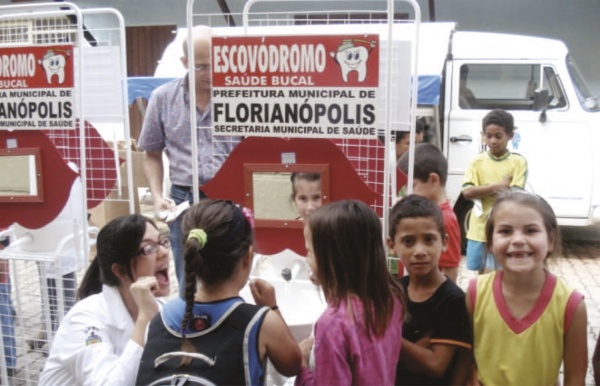Health Program in School
The Health in Schools Program acts on the social determinants of health by incorporating topics such as hygiene, alcoholism and sexual education into school curricula. The program offers skills-building and training activities (workshops, seminars, discussion forums) to educators, teenagers, and parents, encouraging them to become health promoters and create a multiplier effect in their communities.
Meets the criteria established under Health in All Policies:
- Political commitment. Political commitment is limited to the municipal health and education secretariats in Florianopolis, which coordinate the program.
- Separate structure. An inter-institutional working group includes the state and municipal education and health secretariats. In its initial phase, the program placed an outreach coordinator in each school and in the health center.
- Participation of other sectors. The program is a joint effort of the health and education sectors.
- Separate budget. The Health in Schools Program has its own budget, which is funded by the federal government with additional contributions of the Secretaries involved – who offers stimulus for education and health professionals.
- Focus on reducing inequity. The Health in Schools Program aims to reduce inequity by promoting free and universal access to health services for vulnerable groups and by serving 100% of children enrolled in basic education.
- Intersectoral action. The Health in Schools program is carried out pursuant to an intersectoral policy. The Social Welfare Secretariat handles cases of students who experience learning difficulties due to domestic violence or neglect. The program delivers workshops to the school community in order to design a joint health agenda for health care and promotion and lifelong learning that will be followed throughout the school year.
- Public policy. The program contributes to public policy-making for health. As a result of the program, the Health Secretariat included vision screening in its school health care policy. The Education Secretariat improved the school meals program by prohibiting the sale of unhealthy lunches in schools.
- Evidence of results. Although scientific evidence is not available, the program developed an indicator to monitor progress in compliance with the school-based health agenda including the number of students who access primary health care services in schools.
- Social participation. The program sponsors two forums annually to foster youth participation and activism. It also holds workshops and meetings in schools to promote local community involvement (parents' associations, unions, local health boards of health, and so forth).
